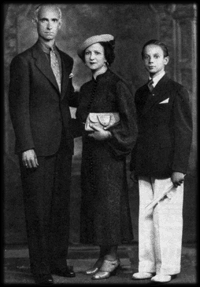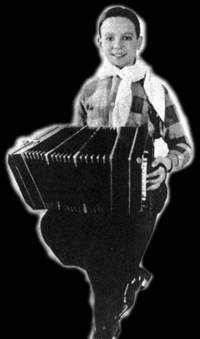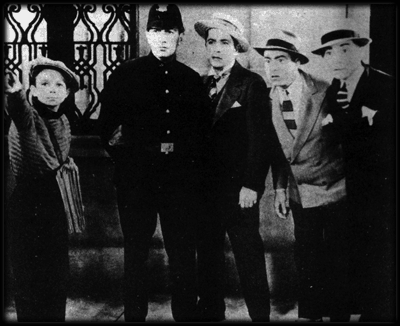By
Piazzolla - Astor Piazzolla, his childhood in New York

few things I recall of my childhood. One of them was the smell of chloroform at hospitals, it was stuck to my nose. When I was two I underwent about six surgical operations on my leg. I had had a paralysis. Later my tonsils were removed. That smell haunted me for a long time. This happened in the United States where I lived with my parents. I must admit that they both fussed over me very much.
 «My mother used to work gluing hair by hair at a fur shop that manufactured artificial furs. And my father was a barber, he spent all day long at his job’s place. I didn’t like being alone and in the streets of New York. My father even worked on Sundays seeing the Italian or Jewish gangsters’ wives that were going to a wedding.
«My mother used to work gluing hair by hair at a fur shop that manufactured artificial furs. And my father was a barber, he spent all day long at his job’s place. I didn’t like being alone and in the streets of New York. My father even worked on Sundays seeing the Italian or Jewish gangsters’ wives that were going to a wedding.
«I attended four schools until I finished grade school. They expelled me for quarrelling. But at one of them I found music. A teacher used to play records for us as examples. She made us listen to the Brahms’ third symphony, or the second movement of a symphony by Mozart. And at the next class we had to recognize each one of them.
«I found it but I didn’t discover it. I didn’t pay attention to the explanations. I couldn’t stop laughing and making my schoolmates laugh. I discovered it later when I was 12 years old.
«We lived in a very long house and there, at the back, beyond a courtyard there was a window and, from there, the sound of a piano was heard. It hypnotized me, I stood still beside it. Later I came to know it was a piece by Bach and that the pianist practiced nine hours a day. He was Bela Wilda and soon he became my teacher. My father and I knocked at his door and when he opened it I was bewildered by his grand piano and the pack of Camel cigarettes he used to smoke. Once again the smells appeared but this time they attracted me and I thought how nice was growing up and being able to play piano and smoking cigarettes.
«As mom had no money and because she worked as a manicurist she agreed to care for his hands for free, of course, and twice a week bring him a dish of gnocchi or ravioli. My teacher loved pasta.
«At home Dad only had recordings by Carlos Gardel and Julio De Caro. Today I’m glad he had those records and not ones cut by other tango men, in general, mediocre musicians. Despite this music did not move me at all, I, a street boy and already a gambler, had discovered in music a stranger, mystical world.
«My old man was very tall, one meter ninety, and he was quite skinny and good-looking. He was an Italian of the Adriatic area. He was fond of motorbikes and had appeared at some races. My mother, instead, was like I am: short-nosed, rather short, very strong and a heavy worker. Her parents were from Tuscany and she possessed a quite peculiar tenderness. They were the kindest people I ever met in my life.
 «In New York I had a friend that played piano, an Argentine, Andrés D’Aquila. He knew the bandoneon keyboard and he taught it to me. Wilda, later in his music classes, made me play Bach on bandoneon. He handed me the sheet music for piano and he showed me what I had to do and what I ought not do. Very soon my father bought me one. Years later, on my comeback to our country, in Mar del Plata, I polished my technique with Líbero Pauloni. I enjoyed playing Mozart, Bach or Schumann. I had never played a tango before Gardel arrived in New York.
«In New York I had a friend that played piano, an Argentine, Andrés D’Aquila. He knew the bandoneon keyboard and he taught it to me. Wilda, later in his music classes, made me play Bach on bandoneon. He handed me the sheet music for piano and he showed me what I had to do and what I ought not do. Very soon my father bought me one. Years later, on my comeback to our country, in Mar del Plata, I polished my technique with Líbero Pauloni. I enjoyed playing Mozart, Bach or Schumann. I had never played a tango before Gardel arrived in New York.
«I met Gardel because my father admired him. One day he carved a wooden figure —carving was one of his passions—. They put on me my best clothes and sent me to the apartments of Beaux Arts where Gardel was living. It was on 48th Street, in Broadway. I had to deliver the wooden figure to him as a gift. He was like a gaucho with a guitar and his face reminded me of a Goya painting.
«I was there to get from him two photos with his signature and dedicated to my father Vicente and my mother. When I arrived I didn’t enter through the door. In the elevator I met Alberto Castellanos who was carrying two milk bottles. I asked him where he was going to and, as he didn’t know how to speak English, he answered me in Spanish:
—Ah! You speak Spanish.
—I’m Argentine, he answered me.
—So am I.
—Wow, you’ll be useful for me, kid. I left the keys and I can’t get in. Do me a favor, go to the fire escape and get through the window. There’s a man sleeping, he’s Gardel. Wake him up and tell him to open the door.

«I was 13 and it turned out an easy thing for me. I woke him up but he wasn’t Gardel. He was Alfredo Le Pera and was in a bad temper. Gardel was in another bed, he had quite different manners. He soon asked me:
—Who are you?
—I’m an Argentine boy that lives here.
—Great!
«But when I said that I played bandoneon he almost fainted. I had breakfast with them, coffee with milk and a pudding with raisins he had ordered to buy. I was with him for about a year. I was his translator when he went shopping to expensive places to buy clothes. He had much money.
«One day he invited me to a barbecue he himself cooked and there I played bandoneon, but not tangos. When I dared with some of them he told me: “Kid, you played wonderfully, but playing tangos you play like a Spaniard!”. We had lunch together several times always at the same place: an inn in Greenwich Village named Santa Lucía. Today that local has changed its name. Now is known as Puerto Rico. He also came home one afternoon where we had tea and mom cooked fritters».
Astor Piazzolla interview partially excerpted from La Opinión Cultural, published on May 30, 1976. Interview made by Carlos Rodari and written by Julio Ardiles Gray and Blas Matamoros.